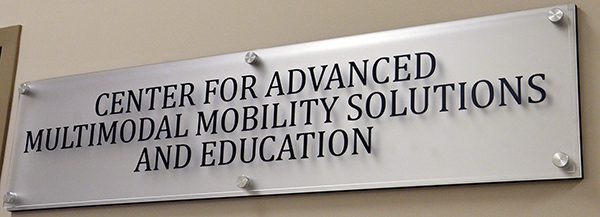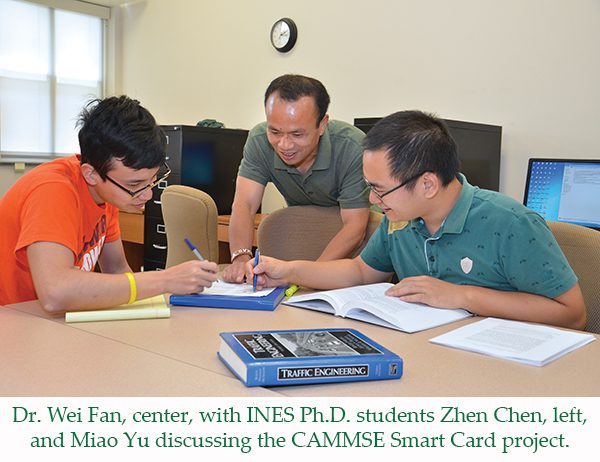$7.7 million USDOT Center CAMMSE Underway

Established in December 2016, the Center for Advanced Multimodal Mobility Solutions and Education (CAMMSE) is now up and running with numerous projects underway. UNC Charlotte is the lead in the multi-institutional initiative, which is funded by a $7.7 million grant from the U.S. Department of Transportation.
Other institutions involved in CAMMSE are Texas Southern University, the University of Connecticut, the University of Texas at Austin and Washington State University. The principal investigator and director for the center is Dr. Wei Fan of the Civil and Environmental Engineering Department within UNC Charlotte’s Lee College of Engineering.
“There are a number of projects now up and running that were part of the original grant proposal,” Dr. Fan said. “We have made significant progress at this point in all areas including research, education and outreach, and technology transfer. Many of our projects are ahead of schedule and under budget.”
Multimodal transportation refers to the integrated network of roads, airports, seaports, rails, transit systems, bicycle and pedestrian trails and walkways. CAMMSE researchers are applying the multimodal term to the movement of people and goods, with the aim of developing innovations to relieve congestion and improve efficiency for both.

“The primary goals of the center are research, technology transfer, education and outreach, and workforce development in the area of multimodal transportation,” Dr. Fan said.
Ten research projects are being conducted in 2017. At UNC Charlotte, Ph.D. students in the Infrastructure and Environmental Systems program are now working on two of the projects.
As part of the “Estimation of Origin-Destination Matrix and Identification of User Activities Using Public Transit Smart Card Data” project, students are mining data to determine patterns for how people are moving. Smart cards are now used in many urban areas to pay bus and rail fares, and the data from such cards provides a great deal of data on passenger demand and transportation system performance. The purpose of the project is to develop a systematic method to demonstrate how passenger information can be mined from smart card data.
The project “Improving the Movements of People and Freight: A Case Study of the Piedmont Atlantic Megaregion” is being done in anticipation of significant population growth in the southeast. The project will direct local and state leaders in developing a blueprint for the region’s rail network and establishing a Southeast Rail Commission that will develop multimodal solutions through 2050. More details on all CAMMSE research project can be found at https://cammse.charlotte.edu/research/current-projects.
In the area of educational outreach and workforce development, Civil Engineering professors Dr. Miguel Pando and Dr. Martin Kane have been actively developing a number of initiatives, including the university’s first transportation summer camp. This week-long day camp will introduce the many aspects of the transportation field. Campers will have hands-on lab activities, go on local supervised field trips, and learn about the transportation field directly from transportation and civil engineering professionals and experts.
To facilitate the transfer of CAMMSE research to the community, Dr. Dave Weggel has been actively working with UNC Charlotte’s Office of Technology Transfer (OTT) to develop an effective plan for technology transfer and implementation. CAMMSE faculty and student researchers have also been actively presenting their research at several conferences.
During a USDOT visit to the UNC Charlotte campus in April, CAMMSE leaders demonstrated the projects currently underway and presented plans for the future. “The feedback from the USDOT visitors was very positive,” Dr. Fan said. “They were really impressed with the number of projects we already have going. They praised the center leadership for being ahead of the curve with the required deliverables.”
Multimodal transportation will be very important in the future, and CAMMSE will be a key part of its development in the southeast, Dr. Fan said. “Multimodal transportation is important in attracting people to urban areas, creating communities that are resilient and robust, and improving the overall quality of life. Hopefully we will make significant contributions to its advancement in the next five years.”